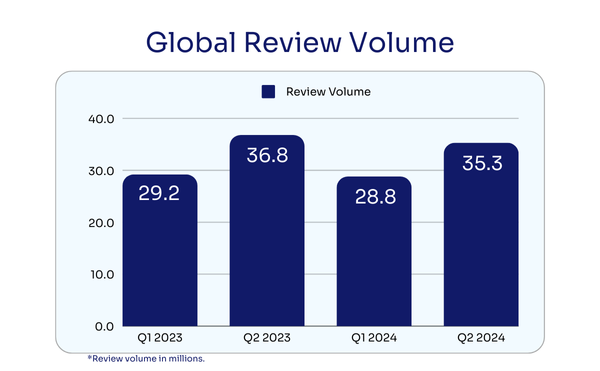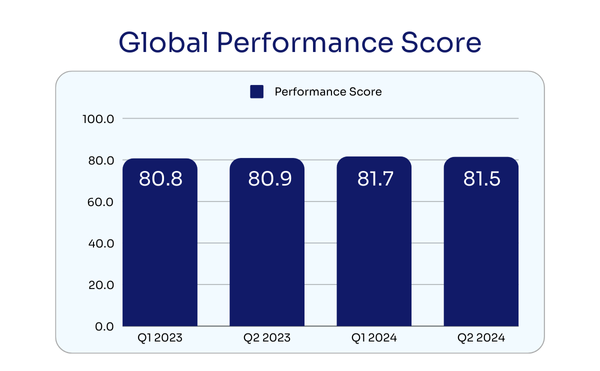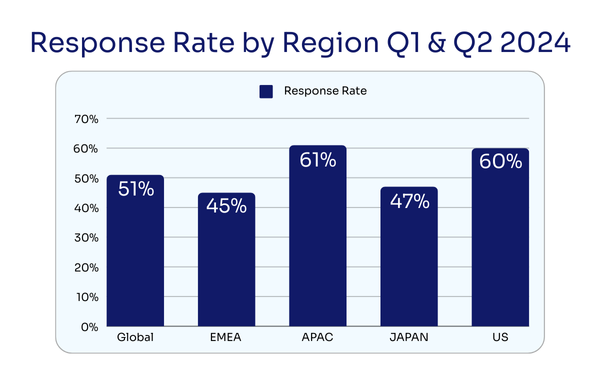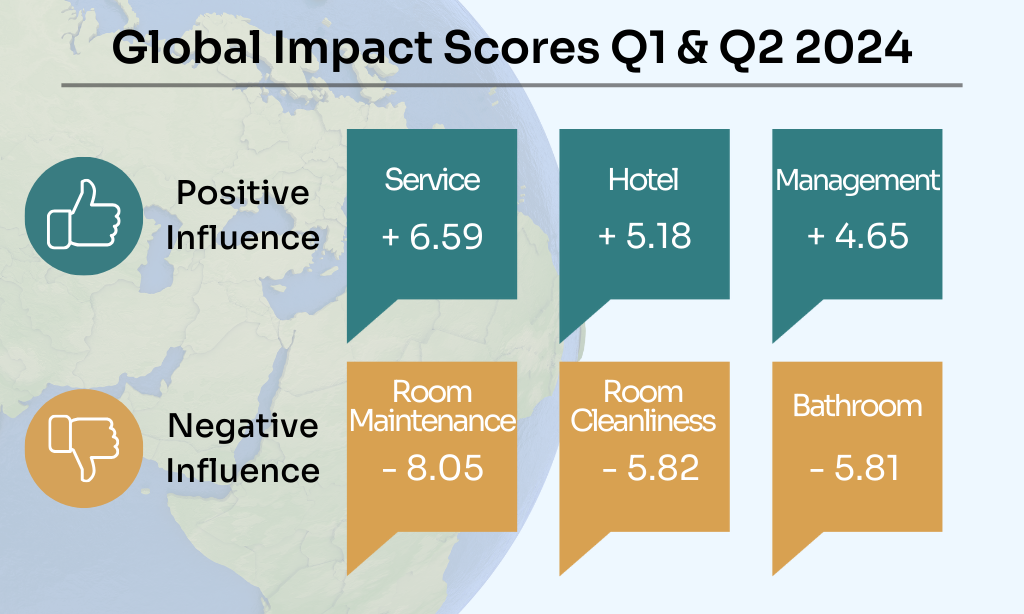Part 1 – GLOBAL
The tourism and hospitality industry in 2024 has undergone a significant transformation, experiencing both opportunities and challenges. With a surge in demand for travel experiences, businesses have encountered obstacles such as escalating costs, price inflation, and a shortage of skilled labor. Moreover, the sector has been confronted with the rising expectations of guests for personalized services, necessitating establishments to adapt to evolving preferences. The relentless advancement of technology has introduced new possibilities and complexities, as companies aim to leverage innovations while ensuring data security and compliance. As the industry navigates through these changes, the primary focus remains on balancing guest demands, operational costs, and technological progress to maintain competitiveness in the dynamic tourism and hospitality landscape. TrustYou analyzed the latest hospitality statistics for Q1 and Q2 2024 on a global and regional level.
The EHL gave some insights into recent market developments and an interesting outlook. The hospitality sector demonstrated impressive growth, increasing from $4,390.59 billion in 2022 to $4,699.57 billion in 2023, indicating a 7.0% compound annual growth rate (CAGR). This substantial advancement underscores the industry’s resilience and capacity to rebound from recent challenges. Moving forward, the global hospitality market is projected to experience a remarkable surge, reaching an estimated $5,816.66 billion by 2027, with an impressive CAGR of 5.5%.
Therefore, investing in the right technology to tackle the challenges of the industry is the way forward to benefit from the increased traveler demand. Check out this recent blog post on navigating hospitality technology buying decisions in a rapidly changing landscape and how to make the best decisions for your hotel!

Unique Customer Insights Make The Difference
TrustYou analyzes big data for the entire industry and gives valuable insights powered by AI that give hotels the information to create the best offer for their guests from start to finish. To effectively measure and improve overall guest experience, hotels can leverage TrustYou’s Customer Experience Platform (CXP) to access key metrics that provide valuable insights into guest feedback and performance. By analyzing these metrics, hotels can deep dive into guest sentiment, operational performance, and areas requiring attention. Understanding and leveraging these metrics can empower hotels to make data-driven decisions, enhance guest experiences, and ultimately drive positive outcomes for their business. In order to analyze the latest hospitality statistics for Q1 and Q2 2024 on a global and regional level, TrustYou considered the following metrics:
- Review Volume: By analyzing the total number of reviews for a property or hotel chain, hotels can evaluate the effectiveness of their review collection efforts. This metric not only showcases the success of gathering reviews but also provides insights into changes in traveler behavior within a region.
- Performance Score: The Performance Score offers an average review score for a specific time frame. Hotels can use this average calculation to gain clear insights into their performance over time, allowing them to track developments and assess the impact of investments.
- Response Rate: Calculating the Response Rate involves determining the percentage of reviews within a selected timeframe that have received responses. Responding to reviews demonstrates that hotels value guest opinions, serving as a potential marketing tool. Future travelers often read responses to understand how hotels handle feedback, especially in response to negative reviews.
- Impact Score: TrustYou’s Impact Scores provide a comprehensive understanding of how guest feedback influences overall review ratings. Whether positive or negative, different aspects of service such as cleanliness or staff friendliness significantly contribute to shaping guests’ impressions. Hotels can use Impact Scores to identify areas for improvement and tailor their offerings to meet guest expectations effectively.
The TrustYou Pulse of the Industry featuring global and regional hospitality statistics for Q1 and Q2 2024 is published in a 5 part series.
#1 Global review volume Q1 and Q2 2024
Global review volume remained stable in comparison to the same period last year. Both quarters 2024 are a little lower with 28.8M in Q1 2024 compared to 29.2M in Q1 2023. In Q2 2024 the review volume increased compared to Q1 but stayed below the same period in 2023 with 36.8M.
In order to gain valuable insights into customer behavior and to keep the review volume up, TrustYou recommends to send both on-site and post-stay surveys. Additionally, problems or issues can be solved before they even arise which helps to avoid negative post-stay feedback and increases review scores.

#2 Global Performance Scores Q1 and Q2 2024
Overall, the global performance score steadily increased over the last year. While in 2023 it was at 80.8 (Q1) and 80.9 (Q2), it has surpassed those numbers in 2024 with 81.7 (Q1) and 81.5 (Q2). This indicates that guests are accepting and validating efforts of hotels who invest in improving the guest experience and take on the challenges that the current state of industry poses.

#3 Global Positive Feedback Ratio Over Time 2022-2024
The positive vs. negative feedback ratio has been stable for a very long time but increased even more this year to a stellar 94%. Efforts to actively ask for feedback throughout the entire guest experience has a very positive effect on the overall score as this number indicates. The high ratio of positive feedback also shows that the industry delivers a consistently high experience for the guest with a focus on service and quality.

#4 Global Response Rate by Region and Global Q1 and Q2 2024
It’s essential to reply to reviews to validate a guest’s opinion and take their feedback into consideration for future investments or improvements. The global winner is APAC with a response rate of 61%, closely followed by the US. EMEA and Japan are below the global average. TrustYou’s “ResponseAI” feature facilitates replying to reviews significantly by delivering personalized responses while saving valuable time and effort in a hectic day-to-day environment.

#5 Impact Scores Q1 and Q2 2024
Hotels can leverage Impact Scores to pinpoint specific areas for enhancement and customize their offerings to better align with guest expectations. By paying attention to and addressing the aspects that contribute most to guests’ impressions, hotels can effectively elevate their service quality and overall guest satisfaction.
Globally, Service is the number one factor that impacts review scores the most positively (+6.59). This includes all kinds of service experiences across all departments. Hotel, which includes categories like facilities and the overall experience, has an impact score of 5.18 followed by good management and taking requests and complaints seriously ranks third with +4.65. On the opposite end, the categories that impacted the score of a hotel the most negatively are Room Maintenance (-8.05), Room Cleanliness (-5.82) and Bathroom (-5.81). Hotels should pay extra close attention to providing an excellent experience when it comes to the actual stay and the rooms, as all negative impact scores are related to factors related to the room.

What to Expect in 2025:
Looking ahead to 2025, the hospitality industry is likely to witness further advancements and transformations. As the industry continues its recovery from the impacts of the pandemic, there will be a heightened focus on building resilience and adapting to changing consumer preferences. The integration of advanced technologies, such as artificial intelligence, automation, and data analytics, will be pivotal in enhancing operational efficiency, personalizing guest experiences, and driving revenue growth. Sustainability will also take center stage, with hotels increasing their adoption of eco-friendly practices and reducing carbon footprints. This emphasis on sustainability includes goals for carbon neutrality, waste reduction initiatives, and obtaining eco-friendly certifications to align with evolving consumer preferences. Additionally, the future of hospitality will see a shift towards a hybrid model that seamlessly integrates virtual and physical experiences, with hotels leveraging technology to offer omnichannel guest interactions, hybrid events, and digital concierge services to cater to changing consumer preferences.
